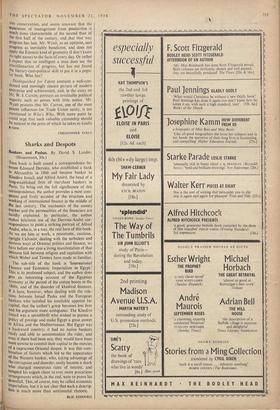Sharks and Despots
Bankers and Pashas. By David S. Landes. (Heinemann, 30s.) THis book is built round a correspondence be- tween Edouard Dervieu, who established a bank in Alexandria in 1860 and became banker to Khedive Ismail, and Alfred Andre, the head of a long-established firm of merchant bankers in Paris. To bring out the full significance of this correspondence, the author provides a most com- petent and lively account of the structure and Working of international finance in the middle of the last century. The mechanics of the money Market and the personalities of the financiers are lucidly explained. In particular, the author Makes felicitous use of the Dervieu-Andrd cor- respondence to paint a striking portrait of Alfred Andrd, who is, in a way, the real hero of this book. As we see him at work, a pessimistic, cautious, upright Calvinist, dealing with the turbulent and devious ways of Oriental politics and finance, we have before our eyes a living manifestation of that intimate link between religion and capitalism with which Weber and Tawney have made us familiar.
The sub-title •of the book is 'International Finance and Economic Imperialism in Egypt.' This is its professed subject, and the author does 8ive an interesting account of the Egyptian economy at the period of the cotton boom in the 1860s, and of the disorder of khedival finances. It is here, however, when dealing with the rela- tions between Ismail Pasha and the European bankers who satisfied his insatiable appetite for capital, that the author's grasp becomes less firm and his argument more ambiguous. The Khedive Ismail was a spendthrift who wished to pursue a policy of prestige and make Egypt a great power in Africa and the Mediterranean. But Egypt was a backward country; it had no native bankers ready and able to accommodate the ruler, and even if there had been any, they would have been most unwise to commit their capital to the mercies of a capricious Oriental despot. It was this com- bination of factors which led to the appearance of the Western banker, who, taking advantage of, the corruption and disorder, easily became a shark Who charged monstrous rates of interest, and tempted his august client to ever more precarious arrangements which, in the end, were to prove his downfall. This,,of course, may be called economic imperialism, but it is not clear that such a descrip- tion is much more than sentimental rhetoric.
ELIE KEDOURIE














































































 Previous page
Previous page